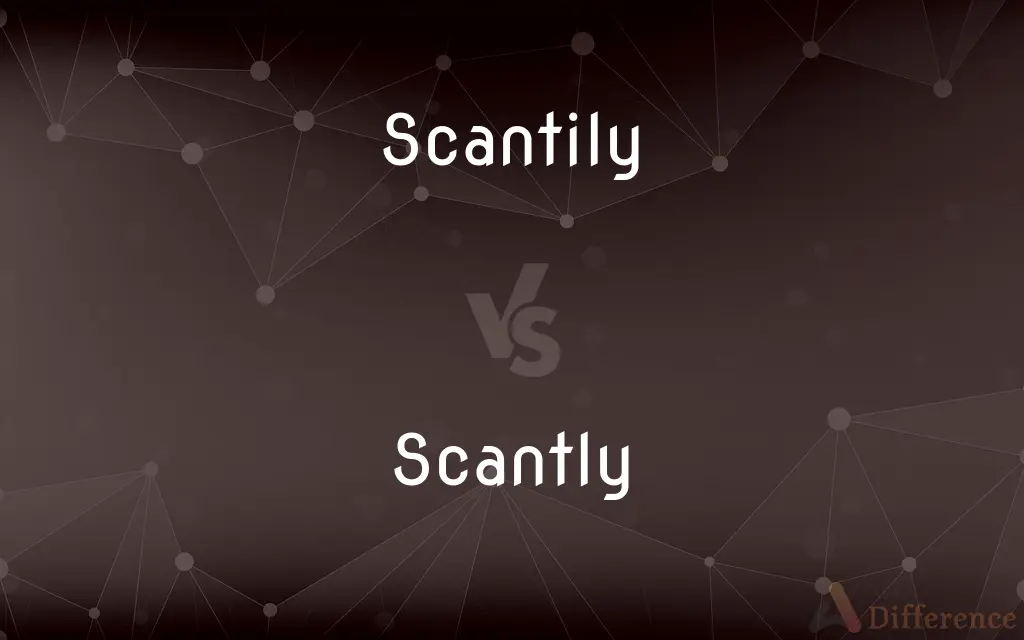Scantily vs. Scantly — What's the Difference?
By Maham Liaqat & Fiza Rafique — Updated on April 23, 2024
Scantily refers to wearing minimal clothing, often suggesting inadequate coverage, while scantly is an adverb describing something done in a limited or barely sufficient manner.

Difference Between Scantily and Scantly
Table of Contents
ADVERTISEMENT
Key Differences
Scantily is primarily used to describe the manner in which someone is dressed, implying that the clothing is minimal and often revealing. Scantly, on the other hand, is used to describe the presence or quantity of something as barely sufficient or minimal.
People dressed scantily are typically wearing very little, which can be contextually linked to fashion, personal choice, or cultural norms. Whereas, describing resources or supplies as scantly suggests they are insufficient for the needs at hand.
Scantily can carry a connotation of attractiveness or provocativeness, depending on the context, highlighting social and cultural attitudes towards dress. Scantly conveys a sense of inadequacy, often used in contexts that emphasize a lack of abundance or generosity.
Scantily-clad individuals may be a subject in discussions about social norms, decency, or even legal issues in certain contexts. Scantly, however, might be used in economic, environmental, or logistical discussions, emphasizing the limitation of resources.
The usage of scantily often appears in lifestyle, entertainment, and fashion discourse, reflecting personal or stylistic expression. Scantly is more likely found in formal or technical discourse, discussing measurements, resources, or allocations that are insufficient or minimal.
ADVERTISEMENT
Comparison Chart
Definition
Wearing very little clothing, often revealing.
In a limited or barely sufficient manner.
Context of Use
Personal attire and fashion.
Describing quantities or measures.
Connotations
Provocativeness, minimal coverage.
Insufficiency, minimal presence.
Common Phrases
Scantily clad
Scantly populated, scantly available
Example Usage
Discussing clothing choices in social contexts.
Discussing resource availability in reports.
Compare with Definitions
Scantily
Minimally clothed.
She was scantily clad in a lightweight summer dress.
Scantly
Minimally available.
Resources were scantly distributed among the teams.
Scantily
Lightly dressed.
The tourists were scantily prepared for the cold weather.
Scantly
Limitedly supplied.
Aid was scantly provided in the disaster-struck area.
Scantily
Skimpy.
Scantily outfits at the party drew a lot of attention.
Scantly
Barely sufficient.
The budget was scantly enough to cover the basic needs.
Scantily
Provocatively dressed.
The theme of the event encouraged scantily styles.
Scantly
Sparingly used.
He spoke scantly, preferring to listen during meetings.
Scantily
Barely covered.
The model wore a scantily designed outfit during the fashion show.
Scantly
Infrequently seen.
The rare bird is scantly observed in this region.
Scantily
Small or insufficient in amount, size, or extent
Scanty rations.
Scanty evidence.
Scantly
Barely sufficient
Paid scant attention to the lecture.
Scantily
Not covering a considerable amount of the body
A scanty bathing suit.
Scantly
Falling short of a specific measure
A scant cup of sugar.
Scantily
Sparingly; not plentifully; not fully; in a scanty manner.
Scantly
Inadequately supplied; short
We were scant of breath after the lengthy climb.
Scantily
In a scanty manner; not fully; not plentifully; sparingly; parsimoniously.
His mind was very scantily stored with materials.
Scantly
To give an inadequate portion or allowance to
Had to scant the older children in order to nourish the newborn.
Scantily
In a sparse or scanty way;
A barely furnished room
Scantly
To limit, as in amount or share; stint
Our leisure time is scanted by this demanding job.
Scantly
To deal with or treat inadequately or neglectfully; slight.
Scantly
In a way that is slightly lacking, that is scant of how much should be provided.
He scantly filled the bag, increasing his profits but getting dissatisified customers.
Scantly
Barely; hardly; scarcely.
Scantly
In a scant manner; not fully or sufficiently; narrowly; penuriously.
Scantly
Scarcely; hardly; barely.
Scantly they durst their feeble eyes dispreadUpon that town.
We hold a tourney here to-morrow morn,And there is scantly time for half the work.
Common Curiosities
Is scantily appropriate in formal settings?
Scantily, due to its association with minimal clothing, is generally considered inappropriate in formal settings.
What does scantly populated mean?
Scantly populated refers to an area that has very few inhabitants or low density.
Can scantily have a negative connotation?
Yes, scantily can carry negative connotations relating to social and cultural norms about decency.
What does it mean to be scantily clad?
Being scantily clad means wearing very little clothing, often revealing a lot of skin.
What are the implications of scantly resources?
Scantly resources imply insufficient amounts that might not adequately meet needs or demands.
How is scantly used in a sentence?
Scantly is used to describe something as minimally or barely sufficient, e.g., "Funds were scantly allocated."
Can scantily be used to describe something other than clothing?
Typically, scantily is specifically used in reference to how someone is dressed.
How does scantly relate to economic discussions?
Scantly is often used in economic contexts to discuss limited or insufficient quantities of financial or material resources.
What are cultural perceptions of scantily clad individuals?
Cultural perceptions can vary widely, with some viewing scantily clad individuals as expressing freedom or style, while others may see it as inappropriate.
Is there a way to use scantly in a positive light?
While typically connoting insufficiency, scantly can be used positively in contexts where minimalism or conservation is valued, such as using resources sparingly to avoid waste.
Share Your Discovery

Previous Comparison
Unselect vs. Deselect
Next Comparison
Adviser vs. AdvisorAuthor Spotlight
Written by
Maham LiaqatCo-written by
Fiza RafiqueFiza Rafique is a skilled content writer at AskDifference.com, where she meticulously refines and enhances written pieces. Drawing from her vast editorial expertise, Fiza ensures clarity, accuracy, and precision in every article. Passionate about language, she continually seeks to elevate the quality of content for readers worldwide.














































